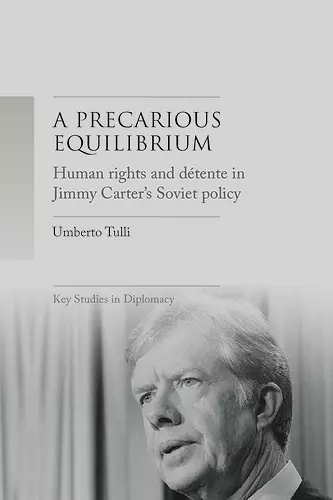A Precarious Equilibrium
Human Rights and déTente in Jimmy Carter's Soviet Policy
Format:Hardback
Publisher:Manchester University Press
Published:25th Feb '20
Currently unavailable, and unfortunately no date known when it will be back

In January 1981, just days before Jimmy Carter left the White House, many of the president’s officials were well satisfied with the administration’s campaign to promote human rights. But as commentators, scholars, and the incoming president began to critique Carter’s bipolar policy, it became clear that Carter had not only failed to persuade the American public that he had a clear grasp on the international role of the US, but he failed to build a lasting domestic consensus on foreign policy.
The Carter administration aimed to renew its ideological challenge to the USSR through human rights and to persuade the Soviets to ease internal repression in order to strengthen Congressional support for détente and arms control. Contrary to what he envisioned, the more vigorously the White House pursued a pro-human rights agenda, the more the Soviets lost interest in détente; the more the administration relegated human rights to quiet diplomacy, the more critics within the United States accused the President of abandoning his commitment to human rights. In the end, the White House lost the opportunity to stabilise bipolar relations and the domestic support Carter had managed to garner in 1976. Critics of détente, helped by the Iran hostage crisis and the Soviet invasion of Afghanistan, defeated him.
Based on recently declassified archival documents, A precarious equilibrium offers a fresh interpretation of President Jimmy Carter’s human rights policy and its contradictory impact on US–Soviet affairs.
'Readers looking for a nuanced and informative study will not be disappointed. Utilizing a wide array of archival research, Tulli recounts Carter’s efforts to promote human rights in the Soviet Union, which intersected with
détente. While such arguments are not as novel as Tulli suggests, A Precarious Equilibrium still makes an important contribution to explaining how Carter waged the Cold War.'
Christian Philip Peterson, Ferris State University, Journal of Contemporary History 57(1)
ISBN: 9781526146021
Dimensions: 234mm x 156mm x 14mm
Weight: 494g
224 pages